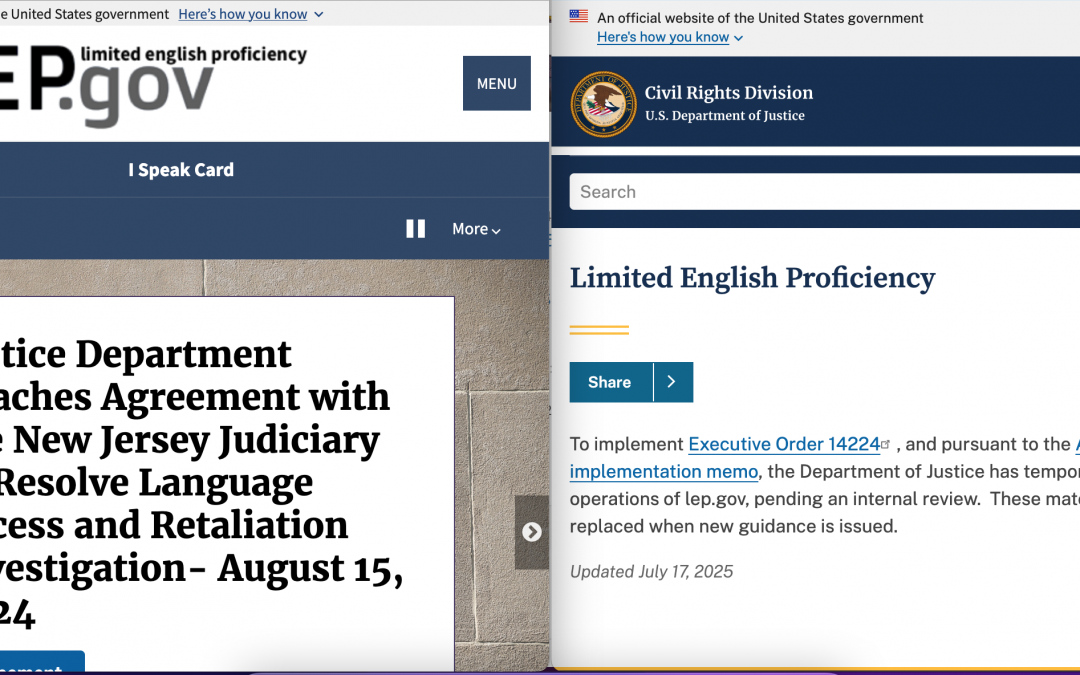WASHINGTON – On March 1, President Donald Trump issued an executive order declaring English as the United States’ official language. Since then, some federal agencies, like the Department of Justice and the Department of Housing & Urban Development, have removed multilingual resources from their websites, others have not. The executive order does not require their removal.
Language access, or providing non-English translation services or materials, assists over 25 million individuals in the United States who have limited English proficiency (LEP). Experts say reducing language access will hurt government efficiency.
“It will make government programs less effective because they’ll be unable to reach many individuals that they might reach otherwise,” Jacob Hofstetter, a policy analyst from the Migration Policy Institute, said.
Trump’s executive order repeals a Clinton executive order that required federal agencies to provide language access for public-facing programs.
Since Trump’s order, the DOJ has taken down almost all of its multilingual resources. HUD took down much of its multilingual materials, eliminated non-English translation services and issued an “English only policy.” Additionally, lep.gov, a centralized online library of multilingual resources, was suspended in July. The website now reads that the “materials will be replaced when new guidance is issued.”
The website was launched in 2002 by the DOJ and included links to federal agency’s Limited English Proficiency guidance. Hofstetter said this removal could have a rippling effect across the federal government.
“[It] was used as a model for a lot of other agencies’ guidance,” Hofstetter said. “It has also been a key source of technical assistance and information for a wide range of entities that receive federal funding that are seeking to provide language access. Though it was always guidance, the rescinding of it does also represent a pretty serious consequence for the field.”
Hofstetter said Clinton’s original executive order “filled some gaps” in previous legislation, like Title VI and the Civil Rights Act of 1964, that required language access only for federally funded programs, but not federal agencies.
Trump’s guidance comes in the form of an executive order, and can’t override current law. Federally funded programs are still required to provide language access in accordance with previous laws.
Mara Youdelman, managing director of the National Health Law Program, said Trump’s executive order is confusing for some federally funded programs about their language responsibilities.
“It certainly seems to imply, ‘Well, okay, we don’t have to provide services,’” Youdelman said. “But executive orders don’t exist in a vacuum, and they have to be understood and read in conjunction with other requirements.”
She said this confusion is intentionally “sown by this administration” to prevent LEP individuals from getting help.
“There’s also really serious public safety and public health implications that come along with language access as well,” Hofstetter said. “You can imagine if you didn’t issue emergency alerts in languages other than English, folks might be exposed to dangers from natural disasters or other events solely due to their limited proficiency in English.”
A memo from Attorney General Pam Bondi says the DOJ plans to issue new language access guidance early next year.
“The Department will issue new guidance, for public comment, that presents clear, practical guidelines that help agencies prioritize English while explaining precisely when and how multilingual assistance remains necessary to fulfill their respective agencies’ mission and efficiently provide Government services,” Bondi said.
Hofstetter warned that this could be just the start of limiting language access.



